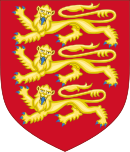| This article is part of a series on |
| Politics of the United Kingdom |
|---|
 |
|
|
| This article is part of a series within the Politics of the United Kingdom on the |
 |
|---|
English votes for English laws (EVEL) was a set of procedures of the House of Commons of the Parliament of the United Kingdom whereby legislation that affected only England required the support of a majority of MPs representing English constituencies. The procedures were in place between 2015 and 2021. They were developed following devolution in the United Kingdom as a result of the West Lothian question, a concern about the perceived inequity of MPs from Northern Ireland, Scotland and Wales, sitting in the House of Commons being able to vote on matters that affected only England, while MPs from England were unable to vote on matters that had been devolved to the Northern Ireland Assembly, the Scottish Parliament and the Senedd.[1]
During the 2000s a number of pieces of legislation which affected only or mainly England were passed by the UK Parliament, although the votes cast by MPs were such that the legislation would not have been passed if only the votes cast by MPs representing English constituencies had been counted.[2] The opposition Conservative Party in 2008 commissioned a report, "Devolution, The West Lothian Question and the Future of the Union", which proposed some procedural changes restricting the participation of MPs representing non-English constituencies during the passage of bills relating only to England.
While the Conservatives were in government from 2010 to 2015 in coalition with the Liberal Democrats, they set up the McKay Commission to look into the question. The Commission proposed that bills in the House of Commons which affected England solely or differently should require a majority vote of MPs representing English constituencies.[3] The Conservative manifesto for the 2015 general election included a proposal that England-only legislation should require approval from a Legislative Grand Committee prior to its Third Reading in the House of Commons.[4] Having won a majority in that election, the Conservative government used a change in standing orders in October 2015 to give MPs representing English constituencies a "veto" over laws only affecting England.[5]
The system of English Votes for English Laws was suspended in April 2020,[6] and abolished by Boris Johnson's Conservative government in July 2021, returning to the previous system with no special mechanism for English laws.[7]
- ^ "Hague and Brown clash over 'English votes for English laws'". BBC News. BBC. 14 October 2014. Retrieved 14 October 2014.
But Mr Hague said the issue of "English votes for English laws", known as the West Lothian Question, had been talked about for nearly 20 years but nothing had been done.
- ^ "Scots MPs attacked over fees vote". BBC News. 27 January 2004.
- ^ "England-only laws 'need majority from English MPs'". BBC News. 25 March 2013.
- ^ "Election 2015: PM sets out 'English votes' timetable". BBC News Online. 24 April 2015. Retrieved 4 July 2015.
- ^ "English vote plan to become law despite objections". BBC News. BBC. 22 October 2015. Retrieved 24 October 2015.
- ^ Cite error: The named reference
Maguirewas invoked but never defined (see the help page). - ^ "Commons scraps English votes for English laws". BBC News. 13 July 2021. Retrieved 14 July 2021.


